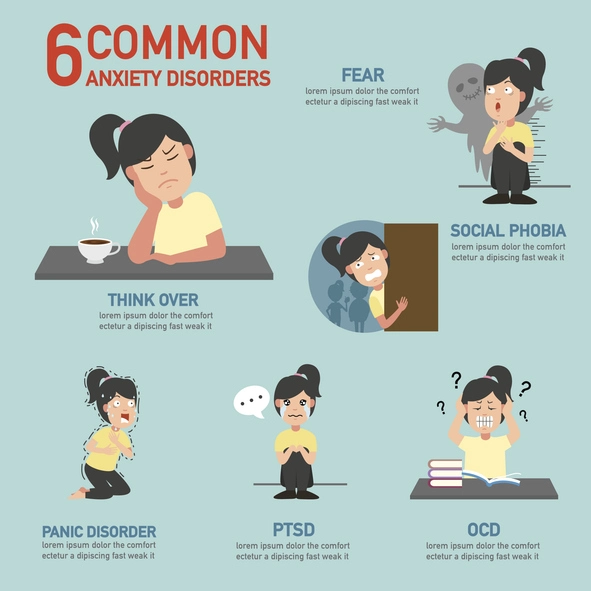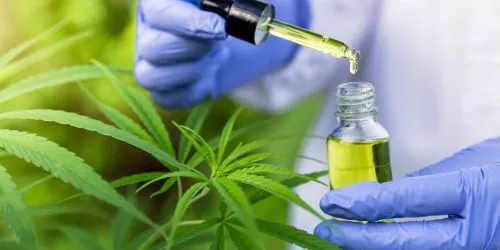
“Research indicates that CBD positively influences the HPA axis, a network that controls the body’s response to stress. By potentially reducing overactivity in the HPA axis, CBD may help the body adapt better to stress, easing both the mental and physical symptoms of anxiety”
Professor Mike Barnes
Consultant Neurologist

Introduction to ANXIETy
Anxiety is a natural, often beneficial response to stress or danger. It’s a complex reaction involving both emotional and physiological changes, preparing the body for a “fight or flight” response. However, for many people, anxiety extends beyond these moments, becoming persistent and disruptive. This is classified as an anxiety disorder, when it consistently interferes with daily life.
Anxiety statistics
- In the UK, over 8 million people are experiencing an anxiety disorder at any one time (Mental Health UK)
- Anxiety disorders are more common among young women aged 16 to 24 than in other agesex group in England
- 50 to 69 year olds are most likely to have an anxiety disorder as adults (4.67%).
- An estimated 822,000 workers are affected by work-related stress, depression or anxiety every year (Health and Safety Executive)
Sources:
Mental Health UK - mentalhealth-uk.org
Champion Health -
championhealth.co.uk
Common types of anxiety disorders include:
01
Generalized Anxiety Disorder (GAD):
Generalized Anxiety Disorder (GAD) is a mental health condition characterized by excessive, uncontrollable worry or anxiety about a variety of topics, events, or activities. This worry is often disproportionate to the situation at hand and can be difficult to control. People with GAD tend to anticipate disaster or worry excessively about things like work, health, social interactions, or minor everyday tasks.
02
Panic Disorder:
Panic Disorder is a type of anxiety disorder characterized by recurring and unexpected panic attacks. A panic attack is a sudden episode of intense fear or discomfort that reaches its peak within minutes and can occur without warning or any obvious trigger. During a panic attack, the individual may feel a sense of impending doom or a fear of losing control, and the experience can be very distressing.
03
Social Anxiety Disorder (SAD):
Social anxiety disorder involves intense fear of certain social situations—especially situations that are unfamiliar or in which you feel you’ll be watched or evaluated by others. These situations may be so frightening that you get anxious just thinking about them or go to great lengths to avoid them, disrupting your life in the process.
04
Obsessive-Compulsive Disorder (OCD):
Obsessive-compulsive disorder (OCD) is a condition in which you have frequent unwanted thoughts and sensations (obsessions) that cause you to perform repetitive behaviors (compulsions). The repetitive behaviors can significantly interfere with social interactions and performing daily tasks.
05
Post-Traumatic Stress Disorder (PTSD):
Post-Traumatic Stress Disorder (PTSD) is a mental health condition that can develop after an individual has experienced or witnessed a traumatic event. These events might include things like natural disasters, accidents, combat or war-related experiences, physical or sexual assault, abuse, or the sudden loss of a loved one.
The Limitations of Traditional Treatments
Despite the availability of numerous treatment options, many people continue to struggle with anxiety problems. Traditional treatments for anxiety typically fall into two main categories: medication and psychotherapy. These methods have been widely used and can be effective, although they also come with limitations and potential side effects. Overall, traditional anxiety management methods can be effective in managing anxiety, but they may not suit everyone.
Introduction to CBD and ANXIETY
Cannabidiol, or CBD, is a naturally occurring compound found in the hemp plant (Cannabis Sativa). Unlike tetrahydrocannabinol (THC), another compound found in cannabis plants, CBD does not produce a psychoactive effect, which means it does not cause a “high”.
CBD has been gaining popularity in recent years as a food supplement and ingredient in topical products such as creams and balms. In parallel to this, there has been a significant increase in medical research studies and clinic trials looking at the therapeutic effects of CBD.
How Does CBD work?
To understand this, it’s important to first have a basic understanding of the endocannabinoid system (ECS), which is a complex cell-signalling system found in the human body. The ECS is involved in regulating a variety of psychological and cognitive processes, including pain sensation, appetite, mood, and sleep.
CBD interacts with the body’s endocannabinoid system (and other systems) by positively affecting the cannabinoid receptors, primarily CB1 and CB2 receptors. It also interacts with other receptors.
CBD also works in other ways. Current research suggests CBD suppresses the breakdown of anandamide, a naturally occurring cannabinoid in the body that is responsible for activating the CB1 and CB2 receptors.
By doing this, CBD indirectly increases endocannabinoid levels within the body, suggesting it may enable them to continue supporting the function of the ECS, and contributing to the maintenance of a balanced and healthy internal state.
For mood and emotional stability, the ECS plays an important role by interacting with chemicals such as serotonin and dopamine, which are closely linked to feelings of happiness, relaxation, and stress relief. When the ECS is disrupted or out of balance, it can affect mood regulation and potentially contribute to mood disorders, such as anxiety and depression. This is why the ECS is a key area of study in understanding how CBD might help manage anxiety.
Another mechanism involves anandamide, often called the “bliss molecule.” Anandamide is a natural endocannabinoid that promotes happiness and reduces stress. CBD prevents the breakdown of anandamide by inhibiting an enzyme called FAAH, which would otherwise degrade it. With higher levels of anandamide in the brain, people may experience enhanced feelings of well-being.
CBD also appears to influence the hypothalamicpituitary-adrenal (HPA) axis, a network that controls the body’s response to stress. When overactive, the HPA axis can increase anxiety and lead to physical symptoms like increased heart rate and tense muscles. By potentially reducing overactivity in the HPA axis, CBD may help the body adapt better to stress, easing both the mental and physical symptoms of anxiety.
Through these various interactions with the ECS and associated neurotransmitters, CBD provides a multifaceted approach to managing anxiety. The effects can extend to both the mind and body, potentially offering relief from symptoms like constant worry, nervousness, and physical tension.
Some quick facts about CBD
- CBD is legal in the UK
- Regulated by the FSA
- It comes from industrial hemp not cannabis plants
- Oldest recorded medicine
- CBD is non-addictive
- CBD is relative safe (WHO report)


There are currently 34 different clinical trials of cbd (cannabidiol) being undertaken in Europe. Source: EU Clinical Trials Register
https://www.clinicaltrialsregister.eu
Research and Evidence on CBD for ANXIETY
A 2015 research study published in Neurotherapeutics (4. Blessing EM et al.,2015) suggests one way CBD may help reduce anxiety through the ECS by influencing serotonin receptors, specifically the 5-HT1A serotonin receptor. This receptor is closely involved in mood, anxiety, and emotional processing. By interacting with this receptor, CBD appears to boost serotonin activity, promoting a calming effect that may relieve feelings of anxiety.
A 2019 research study (3. Scott Shannon et al., 2019) published in The Permanente Journal showed that CBD might help with sleep and anxiety. In the study, 72 adults with anxiety or sleep issues were given CBD daily. After a month, 79.2% of the participants reported decreased anxiety levels.
Research and Evidence on CBD for ANXIETY
Summary
Anxiety disorders are common and can be debilitating, but traditional treatments like therapy and medications have provided significant relief for many. However, these treatments may not work for everyone, and interest in alternative approaches, like CBD, is growing. The initial research on CBD as a treatment for anxiety is encouraging, pointing to potential benefits in reducing symptoms, improving sleep, and stabilising mood. As the body of research grows, CBD could become a viable addition to the options available for managing anxiety.
Professor Mike Barnes

Latest Research and clinical trials on cbd and SLEEP
Cannabidiol in Anxiety and Sleep: A Large Case Series:
Scott Shannon, MD, Nicole Lewis, ND, Heather Lee, Shannon Hughes -2019
Cannabidiol as a Potential Treatment for Anxiety Disorders:
Blessing EM, Steenkamp MM, Manzanares J, Marmar CR - 2015
















